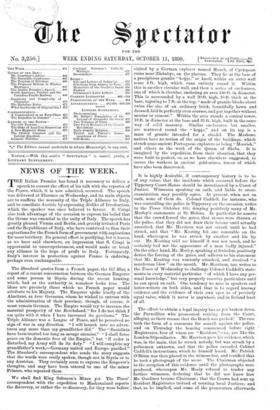It is highly desirable, if contemporary history is to be
of any value, that the incidents which occurred before the Tipperary Court-House should be investigated by a Court of Justice. Witnesses speaking on oath, and liable to cross- examination, may possibly agree. At present, when not on oath, none of them do. Colonel Caddell, for instance, who was controlling the police in Tipperary on the occasion, writes to the Times (October 4th) denying positively many of Mr. Morley's statements at St. Helens. In particular he asserts that the crowd forced the gates, that stones were thrown at the police, that they did not draw their batons until actually assaulted, that Mr. Harrison was not struck until he had struck, and that "Mr. Keating hit one constable on the head, whereupon he was struck by another and his lip cut. Mr. Keating told me himself it was not much, and he certainly had not the appearance of a man badly injured." On the other hand, Mr. Morley, speaking at Swindon, positively denies the forcing of the gates, and adheres to his statement that Mr. Keating was wantonly attacked, and received "a murderous blow" on the mouth. Mr. Harrison, too, writes to the Times of Wednesday to challenge Colonel Caddell's state- ments in every material particular "of which I have any per- sonal knowledge," but very properly reserves particulars until he can speak on oath. One tendency we note in speakers and letter-writers on both sides, and that is to regard hearsay evidence and the evidence of their own eyes as of precisely equal value, which it never is anywhere, and in Ireland least of all.


















































